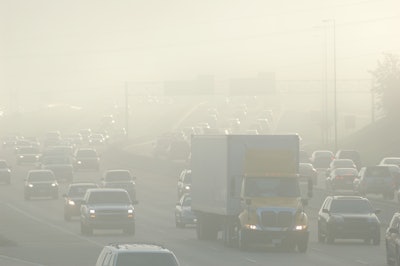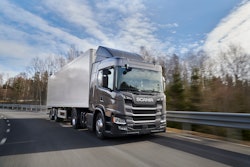
"Nowhere to run, nowhere to hide."
That's how a global panel of scientists working for the United Nations described climate change and the mayhem it's expected to bring down on the economic and ecological life in the U.S.
That phrase could also likely describe stricter emissions and fuel economy regulations in the freight industry, and just like the scientists say about the devastating impact of climate change, it could come sooner than later.
"I think updates to public company disclosures and to fund disclosures [on climate] could bring needed transparency to our capital markets. When it comes to disclosure, investors have told us what they want. It’s now time for the Commission to take the baton," Gary Gensler, the chairman of the SEC, said in July.
In fact, the SEC asked for comment from the public as it works on more climate-disclosure regulation. Simultaneously, President Joe Biden has pushed the EPA to write up stricter emissions regulations for the trucking sector.
In a few short years, every single public company may have to disclose their emissions data for public scrutiny. From 2020 to 2018, "green" financial products have exploded in popularity, increasing tenfold to $51 billion, market data firm Morningstar Inc reported. Increasingly, investors are flocking to climate and socially conscious investing, and the SEC has taken notice.
"Why am I talking about climate risk?" asked Gensler. "Simple: because investors are."
While Gensler floated the idea of benchmarking climate data to certain industries, to keep trucking companies from being held to the emissions standards of insurance companies, for example, this will likely light a fire under fleets efforts to go green.
Both public fleets and fleets looking to get acquired, therefore, should consider how mandatory climate-disclosure regulation may impact their business.
How big fleets are preparing for increased climate scrutiny
As far back as 2014, shipper Owens Corning pushed to move 50% of its freight with natural gas-powered vehicles, citing the relative stability of CNG and RNG prices compared to diesel, which neared $4 a gallon that year.
More recently in 2021, Amazon ordered more than 700 CNG Class 6 and Class 8 trucks with engines supplied by Cummins-Westport.
Traditionally, more retail-facing brands like Amazon and Walmart have faced scrutiny over emissions, while the fragmented freight and logistics industry has not. However, this has begun to change.
Recently, the Truckload Carriers Association, which includes 210,000 trucks with a combine total of $38 billion in annual truckload revenue, launched a PR initiative called #Truckloadstrong to demonstrate the industry's commitment to safety, efficiency, and the essentiality of truckload carriers for the nation.
Major public fleets like XPO Logistics and U.S. Express already release extensive annual reports on Environmental, Sustainability and Corporate Governance (ESG), which has become a booming category of investment. Companies with good ESG scores can market themselves as green investments in the growing sector, and reporting firms like MSCI show big fleets like J.B. Hunt and FedEx taking steps to improve their scores.
But while ESG investing has grown, no federal standards exist for measuring or reporting such data.
Gensler, in his comments, suggested a uniform format for such disclosures, but also allowing room for both qualitative and quantitative measures of any data that investors would find "decision-useful."
What would climate-conscious trucking look like?
Unlike some businesses, moving freight across requires some carbon and GHG-intensive processes and there's no getting around it. The freight industry, quite simply, can't escape its role as a consumer of energy. Until zero-emission powertrains and the infrastructure to support it proliferates across the country, diesel fleets will dominate the road.
But, even in 2021 we have some idea of what the future of the freight industry might look like when the big carriers all need to disclose their emissions data.
The COVID pandemic highlighted the complexity and global nature of today's supply chains. Not only do complex and vast global supply chains complicate industrial production, they also spike emissions. A recent scientific paper published in Nature.com suggested "regionalizing production and consumption where possible to reduce freight" as one possible model for a greener freight industry.
Ben Sharpe, a senior researcher at the International Council on Clean transportation, said that more regional fleets would lend themselves to zero emissions technology like electric or hydrogen powered vehicles, and the shift would likely be accelerated by government mandates.
"We’re expecting governments to come down internally with some regulations that ask more or less a complete turnover to zero emissions technology in next 20 years," said Sharpe. "When we look back and use history as a guide, that’s an extremely fast turnover."
To adapt to this quick change, Sharpe said "don't be afraid to ask for help."
"Really all stakeholders, government included, need to be realistic about the need for extensive support to the industry. This is going to be a very big deal to say the least.This requires an all new ecosystem in terms of the fuel, infrastructure, and maintenance. Fleets need to be willing to ask for help. Governments need to be available to provide that help, whether that's financial or education."
Additionally, the concept of regional hub-and-spoke models for freight could potentially allow drivers more home time and less over the road demand.
But, as scrutiny increases on emissions from the freight industry, it also increases on potential competitors like aviation and maritime shipping. For this reason, over the road long haul freight transportation will likely remain a business reality for some time.
Additionally, the same animus moving people towards ESG investing also values corporate responsibility and the social impact of freight enterprises. In that way, freight companies may gain favor in ESG circles by simply instituting responsible corporate practices despite unpleasant realities around emissions in freight.
Today, the air that leaves the exhaust pipes of diesel trucks in the freight industry is cleaner than the air that enters the intake. The freight industry has made massive strides towards decarbonization and environmental responsibility. As the SEC pushes public companies towards climate disclosures, the time has come for fleets public and private to make the case for themselves as responsible stewards of the environment.











